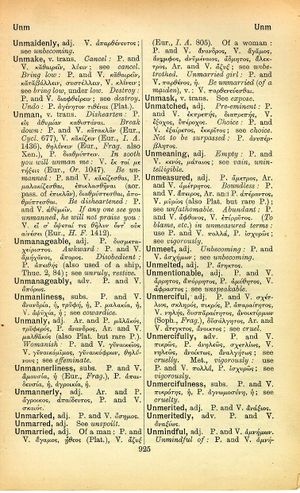unman
From LSJ
θεωρεῖται δὲ ἀνοησίᾳ κρείττονι νοήσεως → it is grasped only by means of an ignorance superior to intellection, it may be immediately cognised only by means of a non-intellection superior to intellection
English > Greek (Woodhouse)
v. trans.
Dishearten: P. εἰς ἀθυμίαν καθιστάναι.
Break down: P. and V. κατακλᾶν (Eur., Cycl. 677), V. κακίζειν (Eur., I. A. 1436), θηλύνειν (Eur., Frag. also Xen.), P. διαθρύπτειν.
In sooth you will unman me: V. ἔκ τοί με τήξεις (Eur., Or. 1047).
Be unmanned: P. and V. κακίζεσθαι, P. μαλακίζεσθαι, ἐπικλασθῆναι (aor. pass. of ἐπικλᾶν), διαθρύπτεσθαι, ἀποθρύπτεσθαι.
Be disheartened: P. and V. ἀθυμεῖν.
If any one see you unmanned, he will not praise you: V. εἴ σʼ ὄψεταί τις θῆλυν ὄντʼ οὐκ αἰνέσει (Eur., H. F. 1412).

